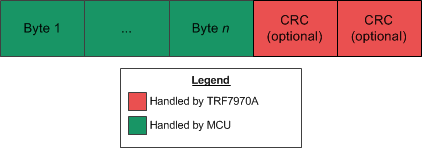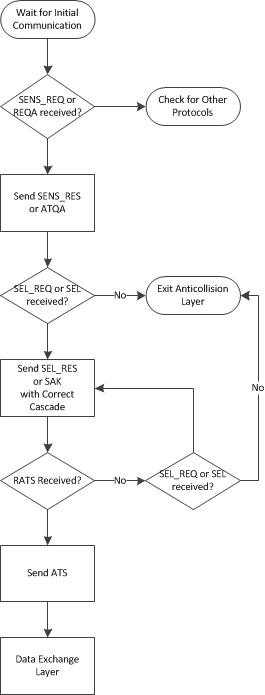SLOA208B November 2014 – March 2019 TRF7970A , TRF7970A
-
NFC card emulation using the TRF7970A
- Trademarks
- Terms, Definitions, and Symbols
- 1 Introduction
- 2 Card Emulation
- 3 Configuration and Commands for Type 4 Tag Platforms
- 4 Hardware Description
- 5 Card Emulation Firmware Example
- 6 Quick Start Guide
- 7 Operational Overview
- 8 Card Emulation Interoperability Results
- 9 Conclusion
- 10 References
- Revision History
2.1.1 Card Emulation Type A
The frame format for Data Exchange Protocol (DEP) packets at 106 kbps during anticollision(see Figure 3) is based on NFC-A technology specifications in NFCForum-TS-DigitalProtocol-1.0 or the ISO 14443-3 specifications.
 Figure 3. Frame Format for Card Emulation Type A Commands During Anticollision
Figure 3. Frame Format for Card Emulation Type A Commands During Anticollision Initially, when configured for Type 4A tag platform emulation, the TRF7970A must be receiving without CRC, because of the ISO 14443A protocol being used. After receiving commands from the reader/writer, the following registers must be modified before and after the anticollision is completed:
- ISO Control Register (0x01) → 0xA4 (ISO 14443A 106 kbps, receive without CRC during anticollision, before Select command)
- ISO Control Register (0x01) → 0x24 (ISO 14443A 106 kbps, receive with CRC, after anticollision is completed).
- Send packet:
- Reset FIFO (0x0F) direct command.
- Transmission without (0x10, anticollision before Select command) or with (0x11, after anticollision is completed) CRC direct command.
- TX Length Byte 1 and 2 (0x1D and 0x1E) registers
- Write the response to the FIFO.
or
The ISO control register needs to be modified for the anticollision state to receive without CRC for the required commands (See the TRF7970A data sheet and ISO/IEC 14443-3 specification for more information). When the anticollision is completed, the ISO Control register needs to be modified to receive with CRC. Step 2 must be used to send commands to the reader/writer.
Figure 4 shows the Type A anticollision flowchart. The TRF7970A supports only 106 kbps for card emulation of Type A.
 Figure 4. Card Emulation Type A Anticollision
Figure 4. Card Emulation Type A Anticollision